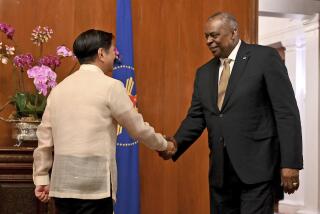We Mustn’t Be Scrooge to the Philippines
- Share via
Earlier this year the American people watched in admiration and amazement as the people of the Philippines carried out one of the few authentic democratic revolutions of our time. Now the heady days of deposing a dictator have given way to the hard work of developing a democracy. The task at hand is less dramatic, but no less important. And once again the United States has a critical role to play.
If democracy is to thrive, and if the communist insurgency is to be contained, President Corazon Aquino’s government must revitalize the depressed Philippine economy. Ferdinand E. Marcos and his cronies siphoned billions of dollars from the government into private investments and bank accounts overseas, leaving behind a depleted treasury, a deepening international debt and rampant unemployment. Unless attended to rapidly, these problems are likely to provide new opportunities for the communists to exploit.
The new government has launched an ambitious program of economic reform.In its first 100 days it has dismantled monopolies in sugar, coconuts, cement and flour, and has begun a process of economic diversification and privatization. These are important policy steps--ones that the Reagan Administration unsuccessfully urged on the Marcos regime. They hold the promise for long-term economic growth that, more than anything else, will be necessary to lay a firm foundation for democracy.
Yet the effect of these measures will be greatly diminished if Aquino and her cabinet are unable to radically reduce the government’s $1.1-billion deficit, which is the fiscal legacy of the corrupt spending spree that characterized the final months of the country’s Marcos regime.
A failure to reduce this budget deficit would produce an inflationary environment in which the domestic and foreign investment needed to fuel economic growth would be discouraged. Yet severe spending cuts would only prolong the current economic misery of the 70% of Filipinos who live in poverty, and dash their hopes for a better life. Large-scale external borrowing is impractical, since the country already faces a staggering $26-billion foreign debt, and must use half of its annual export earnings to service that debt.
The only solution to the Philippines’ fiscal emergency is for the United States and other international donors to make a substantial one-time infusion of budget support. If the Aquino government can get through the current budget crisis, the prospects for long-term economic growth are very good.
To its credit, the Reagan Administration has already converted $200 million tied up in project assistance into an unrestricted cash grant, and is seeking congressional approval for an additional $100 million in economic aid and $50 million in military assistance.
Yet these funds take care of only a small part of the problem, and the United States has every reason to do more. The House subcommittee on Asian and Pacific affairs recently endorsed legislation that Rep. Jack F. Kemp (R-N.Y.) and I introduced to provide an additional $250 million in the current fiscal year for budget support beyond what the Administration has proposed.
In view of our vital strategic interests in the Philippines, including our military facilities at Clark Air Base and Subic Bay Naval Base, Congress should approve this additional assistance to help the new government overcome the continuing communist challenge. If the communists were to win, it would cost the United States billions of dollars to re-create suitable air and naval facilities elsewhere in the region.
The Communist Party of the Philippines and its New People’s Army grew rapidly in the last few years, in part because of the economic devastation that Marcos wrought in his country. Aquino’s political triumph has raised expectations that democracy can bring an improved standard of living. But if the burden of government debt prevents her from doing so, the disillusionment with democracy will be all the more profound, and the attraction of a totalitarian solution will be all the greater.
Even if the communist threat were not so serious, it would still be in the United States’ best interests to help the Aquino government as much as it can. Our continued access to the bases will have to be renegotiated in 1988; a timely gesture now would create a positive atmosphere for those discussions. In addition, it would sweep away the lingering doubts of millions of Filipinos who, because of our prior support of Marcos, still question the depth of our commitment to the Philippines.
The options facing the United States are clear cut. At relatively modest cost we can help save the Aquino government from drowning in a pool of red ink. Or we can take halfhearted measures and increase the risk that a red tide of communism will devastate the Philippines and our strategic interests--all at tremendous cost. We should act in the spirit of George Marshall rather than Ebenezer Scrooge.
More to Read
Sign up for Essential California
The most important California stories and recommendations in your inbox every morning.
You may occasionally receive promotional content from the Los Angeles Times.













